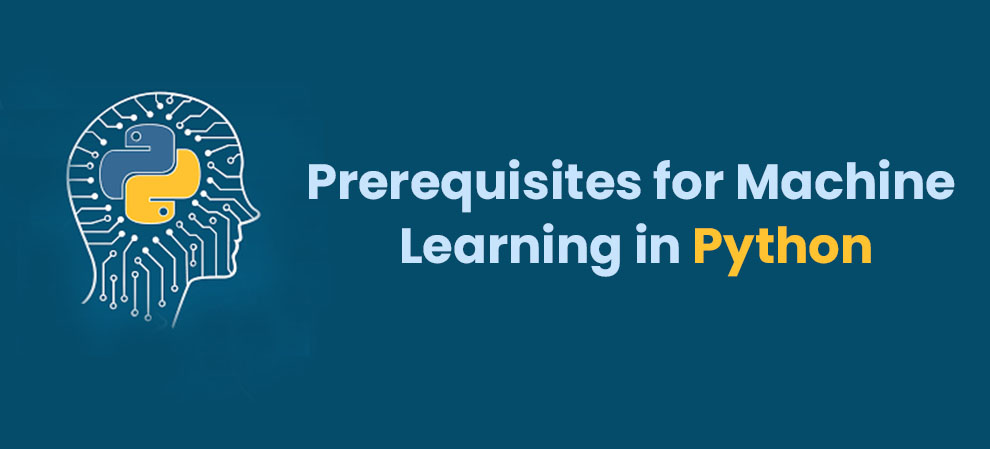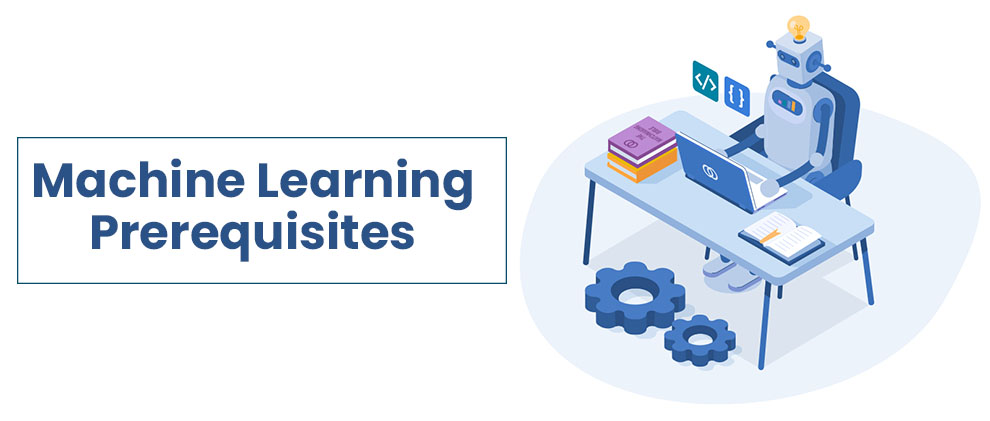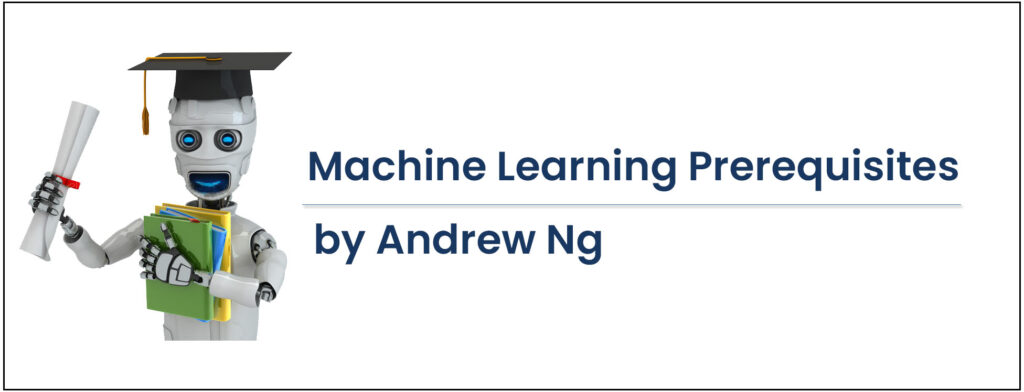Stats, probability, linear algebra and basic python is all you need
Machine Learning has several practical applications you can employ on the job or in your projects. When you acquire Machine Learning with Python certification, you will utilize the TensorFlow framework for advanced techniques like reinforcement learning and natural language processing and building different neural networks.
Beyond this, you will also study the principles behind the working of convolutional, recurrent, and deep neural networks. But, to acquire this certification, you need to be well-versed with some of the prerequisites for machine learning in Python. This guide will detail all these prerequisites you will ever need.
However, before we give you a laydown of all these requirements, a question may be hovering in your head, and we would want to get it out of the way.
Is Python Knowledge Absolutely Necessary for Machine Learning?
You wish to know the Python prerequisites for machine learning, but is your mastery over Python needed for machine learning? Most definitely! Do you want to be in a position to implement the machine learning process from beginning to end?
If yes, then you must be well-versed with two programming languages – Python and R. These two languages offer in-built libraries, making it easy to implement the Machine learning algorithms.
Beyond the fundamental knowledge of the programming languages, you should also be familiar with the correct method for extraction, processing, and analyzing the data, as that is the quintessential skill for machine learning.
So, sort your Python knowledge before you head to a course for machine learning with Python prerequisites. Refer to this guide here to find the suggestion for the top Python courses online.
As for R, here are three good courses that can help you learn in detail:
- Introduction to R – [DataCamp]
- R Programming – Offered by John Hopkins University – [Coursera]
- Data Analysis with R Specialization – Offered by Duke University – [Coursera]
What Are The Prerequisites For Machine Learning In Python?
A. Statistics
Machine learning and Statistics are two inter-coupled domains because maximum concepts studied in machine learning either come from statistics or rely on it. Almost every vital machine learning concept is associated with statistical theories and concepts. Hence, it is essential to have some knowledge about it.
Knowledge of statistics can help you derive logical conclusions from data. As a machine learning enthusiast, you must be familiar with the algorithms, such as:
- Distribution
- Logistic Regression
- Hypothesis Testing
In addition, some statistical concepts required for machine learning include:
- Axioms
- Bayes’ Theorem
- Combinatorics
- Random Variables
- Variance and Expectation
- Conditional and Joint Distributions
You can take the Machine Learning with Python and Statistics – [Udemy] class for statistics understanding.
B. Probability
Probability refers to the possibility of the event’s occurrence. Since every data-driven decision is probability-based, it is a vital requirement for Machine Learning in Python certification. Hence, in ML, you should be thorough with the below-listed probability concepts:
- Probability Rules
- Product or Chain Rule
- Chain Rule
- Bayes Theorem
- Notation
- Independence
- Probability distribution – Joint and Conditional
- Continuous Random Variables
Please remember, these are only a few of the many probability-related prerequisites you must know. The list is long and will depend on the specific area you decide to get into.
You can opt for the Mastering Probability & Statistic Python (Theory & Projects) – [Udemy] class. It will educate you on both Statistics and Probability. So, if you do not want to take individual courses for both, this comprehensive 14 hours of on-demand video can do the needful for you.
C. Linear Algebra
It is the study of vectors and the rules of manipulating these matrices, vectors, and linear transform. It is one of the imperative machine learning math prerequisites and can help the algorithms run seamlessly on multi-dimensional datasets.
In Machine Learning, you will employ linear algebra to develop algorithms and optimize the data. Further, linear algebra aids in covariance matrices, regularization, loss functions, Matrix operations, supporting vector machine classification, and more.
In addition, it also finds use in neural networks and the data science field. Even though it is a crucial prerequisite, you do not have to go in-depth. If you have the fundamental understanding of algebra, you are good to go.
To learn linear algebra in detail, you can opt for the Complete Linear Algebra for Data Science & Machine Learning – [Udemy] course. In this 18-hour session, you will learn all linear algebra aspects.
D. Python
The in-built functions, easy syntax, and comprehensive package support make Python a popular choice for machine learning. You can access more than 2,35,0000 packages via the Python Package Index. It also has the best-supported libraries.
For Machine Learning in Python, you need an understanding of:
- TensorFlow and PyTorch for Deep Learning
- NumPy for Mathematic Operations
- Pandas for File Operations
- Dlib and Open CV for computer vision
- Matplotlib for data visualization
- Scikit-learn for regression algorithms and classification.
E. Other Programming Languages
Even though Python is an excellent programming language, it is somewhat slower than other languages. At times, Python also undergoes multi-threading struggles. So, once you are well-versed with Machine Learning in Python, there are two more programming languages you can learn for a better career in ML. These include:
- R
- Java
F. Data Modeling
It involves the data set’s structure estimation for comprehending trends, patterns, and variations. It can also help with predictive analysis. For predictions, you must be well-versed with the different data properties. Hence, develop an understanding of data modeling.
Enroll in Data Modeling and Relational Database Design using Erwin Udemy class to acquire this knowledge.
G. Calculus
Knowledge of calculus is also one of the crucial machine learning with Python prerequisites for machine learning model construction. Knowledge of multivariable calculus can help you construct a good model.
Some calculus concepts you should know are:
- Gradient or Slope
- Integration and Differentiation
- Chain Rule
- Partial Derivatives
Now that you know all the prerequisites, here are some machine learning courses you could enroll in.
Frequently Asked Questions
Ques 1. Can I learn Python in 3 days?
Ans. You can learn some of the basic elements of Python in three days, but you won’t be a pro at it. You must keep at it and gather real-world industry experience to be proficient.
Ques 2. Why should you never skip the prerequisites?
Ans. Prerequisites are vital requirements associated with any course. When you know about the prerequisites, it will help you decide how much time you need to dedicate to the training and at what level you should begin your learning. If your foundation is weak, the building will collapse sooner or later.
Related Reads: AWS Machine Learning Prerequisites | Prerequisite For Machine Learning and AI
Final Word
So, in this guide, our focus was on all the python prerequisites for machine learning. Remember, it is a lucrative career field but demands effort, experience, and practice. It is not a throne you can claim overnight. But, the rewarding payscale makes it all worth it.





